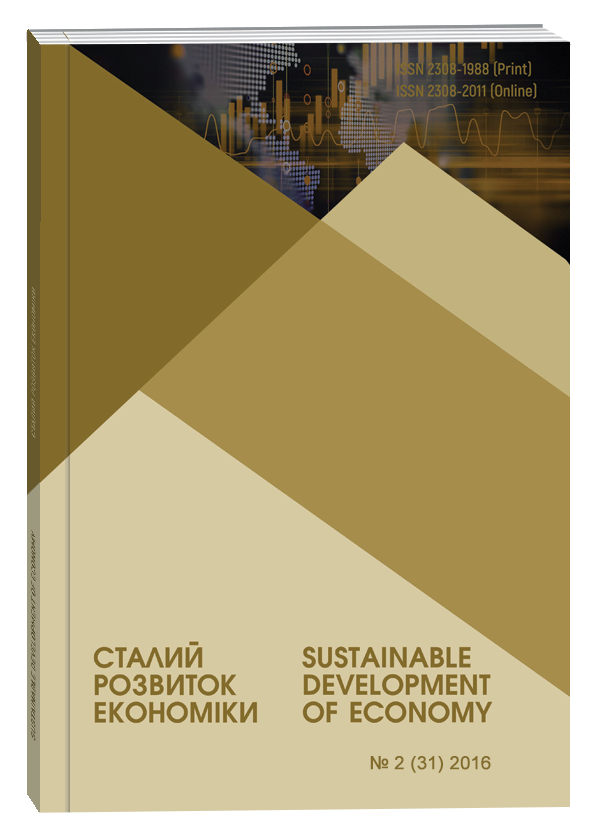TAX PLANNING IN SYSTEM MANAGEMENT FINANCIALLY ECONOMIC BY ACTIVITY OF SUBJECTS OF SMALL BUSINESS, HIS ESSENCE, COMPONENT ELEMENTS AND METHODS
Abstract
Purpose is a ground of essence and component elements of the tax planning in control system financially economic by activity of subjects of small business. Methodology of research. In basis of researches works are fixed both scientific (analysis, supervision) and special, methods of cognition. The methods of analysis and supervision are used for research of essence of the tax planning in control system financially economic by activity of subjects of small business. The methods of cognition are used for the ground of essence and component elements of the tax planning in control system financially economic by activity of subjects of small business with the purpose of increase of efficiency financially economic to activity of member ménage and increase of financial firmness of organization. Findings. Identified tax aspects of market transformation of economy of Ukraine, which are not only in reforming the tax system and tax policy, but also to improve the efficiency of tax planning at the entity level, particularly in reducing the uncertainty of future tax expense of economic actors. Proved that at this stage become particularly relevant issues relating to tax planning in the management of financial and economic activity of small business, its essence, constituents and methods. It is marked that on the modern stage the tax planning can be carried out with the use of general and special methods which it is expedient to use depending on concrete circumstances and aims, and more effective will be their combination that will enable more fully to use all methods of optimization of taxation. In organization of the tax planning on an enterprise important is the system, which would enable to increase the circulating money of enterprise, promote his competitiveness by the independent legal adjusting of level of the tax loading. Grounded, that perfection of organization and indexes of method of evaluation of efficiency of the tax planning will enable the subject of menage to improve the analysis of the paid taxes that as a result will result in the increase of incomes. It is concluded that tax planning is carried out on the principles and methods of tax optimization to improve the efficiency of financial and economic activities of the entity and its financial stability. Originality consists in substantiation of expediency the use of tax planning with a combination of general and special methods depending on the specific circumstances and objectives, which will enable better use all methods of tax optimization. Practical value consists in that the results of research can be used by small businesses for tax optimization and to improve the efficiency of financial and economic activity of the entity.
References
Азаров Л. Систематизація податкового планування на підприємстві / Л. Азаров // Юридичний журнал. – 2004. – № 12. – С. 51-53.
Корецька C.О. Удосконалення методів податкового планування на підприємстві / C.О. Корецька // Агросвіт. – 2011. – № 19. – С. 31-36.
Крисоватий А.І. Домінанти гармонізації оподаткування : національні та міжнародні вектори : [монографія] / А.І Крисоватий, В.А. Валігура. – Тернопіль : Підручники і посібники, 2010. – 248 с.
Крисоватий А.І. Податково-боргові стратегії фіскального регулювання транзитивної економіки / А.І. Крисоватий, Т.В. Кощук // Фінанси України. – 2006. – № 5. – С. 95-107.
Крисоватий А.І. Податковий менеджмент : [навч. посіб.] / А.І. Крисоватий, А.Я. Кізима. – Тернопіль : Карт-бланш, 2004. – 304 с.
Шевченко О.В. Зміни бюджетно-податкового регулювання регіонального розвитку: перші підсумки / О.В. Шевченко [Електронний ресурс]. – Режим доступу : http://www.niss.gov.ua/articles/647
Шубина Л.В. Управление ликвидностью Единого казначейского счета и оценка рисков операций по управлению остатками средств на нем / Л.В. Шубина // Финансы. – 2013. – № 8. – С. 23- 24.
Ярошенко Ф.О. Реформування Податкової системи України в контексті прийняття Податкового кодексу / Ф.О. Ярошенко // Фінанси України. – 2010. – № 7. – С. 3-9.
Azarov, L. (2004), “Tax planning on the enterprise”, Yurydychnyi zhurnal, no. 12, pp. 51-53.
Koretska, S.O. (2011), “Improved methods of tax planning at the enterprise”, Ahrosvit, no. 19, pp.
Krysovatyi, A.I. and Valihura, V.A. (2010), Dominanty harmonizatsii opodatkuvannia: natsionalni ta mizhnarodni vektory [Dominants harmonization of taxation: national and international vectors], monograph, Pidruchnyky i posibnyky, Ternopil, Ukraine, 248 p.
Krysovatyi, A.I. and Koshchuk, T.V. (2006), “Tax promissory strategies of the fiscal adjusting of tranzitivnoy economy”, Finansy Ukrainy, no. 5, pp. 95-107.
Krysovatyi, A.I. and Kizyma, A.Ya. (2004), Podatkovyi menedzhment [Tax management], tutorial, Kart-blansh, Ternopil, Ukraine, 304 p.
Shevchenko, O.V. (2013), “Changes fiscal regulation of regional development: first results”, available at: http://www.niss.gov.ua/articles/647 (access date April 20, 2016).
Shubina, L.V. (2013), “Liquidity Management Treasury Single Account and risk assessment operations management balances on it”, Finansy, no. 8, pp. 23-24.
Yaroshenko, F.O. (2010), “Reforming the tax system of Ukraine in the context of the Tax Code”, Finansy Ukrainy, no. 7, pp. 3-9.


